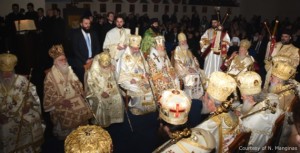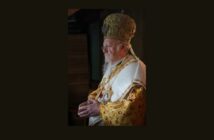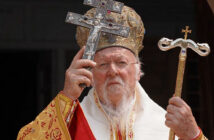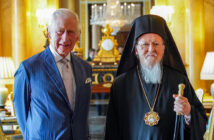 Source: The National Herald
Source: The National Herald
By Dennis Menos
No amount of sugar coating can conceal the fact that the Ecumenical Patriarchate is facing hard times. Its endeavor to resolve the major issues confronting the Church in the modern era by hosting a Holy and Great Council, is beginning to stall; and an old rival, the Patriarchate of Moscow, with designs of its own is challenging the existing order in the Orthodox East.
The recent Synaxis of the 14 Primates of the Orthodox Church, held at Chambesy in Switzerland, provides ample proof of the difficulties that the Ecumenical Patriarchate is experiencing.
Convened by Patriarch Bartholomew to finalize the preparations for the Holy and Great Council, scheduled for Pentecost 2016, the Synaxis regrettably did not rise to the occasion. Of the ten major issues that ultimately will be considered by the Council, it only reviewed and approved the easiest five. Contentious issues, such as the rules for Autocephaly, the rank order of the Orthodox Churches, the need for a common Calendar, and the future of Orthodoxy in the Diaspora, were deferred. Regrettably, convening the Synaxis surfaced also disputes between individual Orthodox Primates, resulting in 3 out of the 14 not attending the proceedings. In an era when the Church is confronted by a multitude of threats, the absences of the Patriarch of Antioch and the Archbishop of Greece from the major Church conclave is extremely difficult to rationalize.
The setback in Chambesy was clearly attributable to two factors: the parochialism that afflicts many of the 14 Autocephalous Orthodox Churches, and the opposition on the part of the Moscow Patriarchate to the plans and modus operandi for the proposed Council submitted by Constantinople. The opposition should not come as a surprise; the challenge by the Moscow Patriarchate to the primacy of the Ecumenical Patriarchate is hardly new. It has its origins in the Ottoman and Tsarist days, and though dormant during the years of communist rule, seems to have returned with renewed potency since the collapse of the Soviet Union and the ascendance to power of President Vladimir Putin, and of his loyal religious leader, Kirill, the Patriarch of Moscow and all of Russia.
It would be unfair to attribute to our Ecumenical Patriarch responsibility for the current difficulties with Russia. Throughout the months prior to the convening of the Synaxis and during its course, Patriarch Bartholomew made repeated efforts to accommodate the desires of his Russian colleague, and in the process eliminate future areas of contention. He agreed, for instance, to the change of the venue of the Holy and Great Council from Constantinople to Chania, Crete, to accommodate Patriarch Kirill’s claim that travelling to Turkey would be unsafe for the Russian delegation. The argument was of course only partly true. Holding the Council at the Church of Saint Irene in Constantinople, as originally planned, would have greatly enhanced the image of the Ecumenical Patriarch as the ‘first among equals’, a role that Patriarch Kirill is known to contest.
Several other compromises were also agreed to by the Ecumenical Patriarch to allow the Synaxis and the Holy and Great Council to go forth. He agreed, for instance, that all decisions at the Council would be by consensus, a position insisted upon by Moscow, which in effect gives a veto power to any Primate bent on defeating an agenda item not to his liking. On a positive note, the Russian Patriarch responded to the Patriarchal overtures in kind, by attending the Synaxis and also agreeing to the convening of the Council in Crete. One condition, however, that is nonnegotiable as far as Patriarch Kirill is concerned, is his insistence that the Ukrainian Orthodox Church that reports to the Moscow Patriarchate is recognized by all branches of Orthodoxy as the only canonical Orthodox Church on the territory of the Ukraine.
A power play of sorts, attesting to the Russian Patriarch’s rising stature came days only after the conclusion of the Chambesy Synaxis, with the announcement of a pending meeting between Pope Francis and Patriarch Kirill, in Havana, Cuba. The announcement was greeted by the Orthodox clergy and laity alike with several as yet unanswered questions. Did the planned meeting, possibly relate to the work of the Synaxis? Had Ecumenical Patriarch Bartholomew be kept informed? If reconciliation with Rome (a priority goal of both East and West) was to be the purpose of the encounter, why was it being conducted by one of the 14 Orthodox Primates and not by the ‘first among equals?’ The last question became even more worrisome when the joint declaration signed by Pope Francis and Patriarch Kirill was published, which referred to the readiness of the two leaders “to take all measures necessary to overcome their historical differences.”
By undertaking to convene the Great and Holy Council of the Church, and in the process strengthen his hand for the future and much anticipated dialogue with Rome, Ecumenical Patriarch is attempting the near impossible. The opposition that he is encountering from his fellow Orthodox Primates and especially Russian Patriarch Kirill, was to be expected. Under the present structure of the Church, getting unanimity by 14 autonomous and independent religious leaders is extremely difficult. It will only be possible when the Orthodox Church modernizes its structure and removes the obstacles that make “change” difficult. In the process, hopefully, it will also find a way to speak with one voice.
Dennis Menos is the author of The Justinian Diaries, a historical novel that focuses on Hagia Sophia in Constantinople. He can be reached at [email protected].



